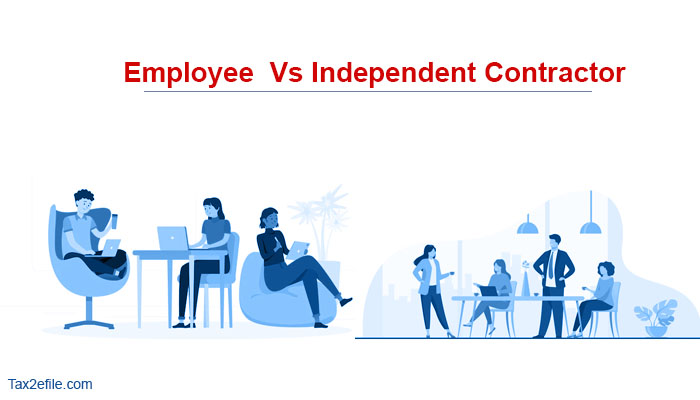- November 29, 2022

Independent contractors are those employees who are free from supervision and direction from their employers and do not have any control over the performance of their duties. They are generally in business for themselves, offering their service to the general public. Independent contractors have an established business, assume risks for their loss and profit, set up their schedule, and are also free to refuse work offers.
The difference between the employer-employee relationship and the employer-independent contractor relationship depends on the level of supervision, control, and direction the person exercises. The US Department of Labor has set to redefine independent contractors based on the ‘Notice of proposed Rulemaking’ released on 13th October 2022. This notice is set to redefine the term ‘independent contractor’ under the Fair Labor Standards Act. This change is of great significance, as it affects how non-employee compensation gets reported in the future tax filing seasons.
Table of Contents
Redefining Independent Contractors vs. Employees:
According to the new definition released by the Department of labor, the ‘Employees’ are individuals the employer recruits for a specific period or an indefinite term. The information covered under this definition concerning tax filing is as follows.
The businesses should report all the compensations given to their employees to the IRS through Form W2.
Employee compensation includes wages, salaries, unemployment benefits, health insurance, bonuses, and other variables.
The employees are prohibited from delegating their tasks to other resources unless their employment contract makes an exception.
All of the employee compensation are subject to the withholding of the federal tax.
Employees defined are either the entities of the employer or the employees of the company.
The employees do not have a minimum payment threshold. All of their compensation are to be reported on Form W-2.
According to this definition, a non-employee or an independent contractor is an individual or entity hired for a specific project for a predefined period. According to this definition,
Independent contractors are self-employed individuals commissioned for work by individuals or entities.
Their compensation is defined as payments that are made to an independent contractor in exchange for their services.
Independent contractors can delegate their tasks to external and internal resources as required.
The compensations for independent contractors are subject to their federal tax withholding only if the vendor doesn’t provide their TIN or submits their incorrect taxpayer identification number.
Payments of more than $600 made to an independent contractor or non-employees during business are subject to their reporting.
What does the new definition of independent contractor state?
The new definition of independent contractor released by the Department of Labor offers guidance on classifying the workers appropriately and seeks to combat employee misclassification. This new definition aims to protect vulnerable workers who are currently not under labor and wage protections.
Such changes affect how the business and entity classify workers in the future instead of the complexities involved in tax compliance. Once the new rules are established, it becomes important to work with a partner and incorporate changes in the income ahead of the tax filing season.
Importance of making these changes:
The clear difference between employees and independent contractors becomes significant now as the Department believes that the entities and the employers are taking undue advantage of the independent contractors and not compensating them appropriately. Such misclassification of independent contractors deprives employees of their core rights, such as overtime pay, minimum wage, Social Security contributions, etc.
The independent contractors are generally paid off the books and are not reported as part of the company payroll. These workers are not required to sign contracts frequently that set standards and guidelines for these employees without placing them on the payroll. Changes to these proposed rulings seem to eliminate such instances and help define the terms clearly.
Redefining independent contractors through the new rule:
The Department of Labor has made updates to the definition of independent contractors. Redefining the non-employees through such a proposed ruling would,
Align the approach of the Department with the FLSA interpretation and the economic reality test.
Determine whether the employee or the worker is an independent contractor under the FLSA.
Assist with the appropriate categorization of independent contractors and employees under the FLSA.
Use a multifactor analysis to ascertain if a person working for a company is an employee or an independent contractor.
Ensure all the factors are thoroughly analyzed without assigning weight to any particular set of factors.
Modify the 2021 independent contractor rule.
The Department is also responsible for ensuring that the organization’s employers do not misclassify the FLSA-covered workers as independent contractors. It also deprives them of their hour and legal wage protections. Such misclassification will deny basic worker protection such as overtime pay and minimum wage, affecting a range of workers in janitorial services, trucking, home care, construction, personal services, hospitality, and restaurant industries,
How does this change of rule affect independent contractors?
This new rule, proposed by the Department of Labor, could affect thousands of economy workers and independent contractors. The workers must be classified as employees of an entity until they are free from the direction and control of the employer concerning their work performance. They should also be doing work out of the general course of business of the employer and are engaged in an independent trade, business, or occupation
Independent contractors play a major role in our economy, and many instances prove that employees misclassify their employees as independent contractors, especially the vulnerable workers of the nation. These new changes proposed by the Department of Labor will also affect the IRS guidelines concerning the taxes proposed on these independent contractors. Independent contractors can take help from expert tax solutions, such as Tax2efile, to stay ahead of these changes and to file their taxes appropriately.
Tax2efile has years of experience in handling such regulatory updates that are made in different industries and is ready to help its taxpayers to navigate through all the future changes with respect to the Tax Forms and the tax filing procedures.


